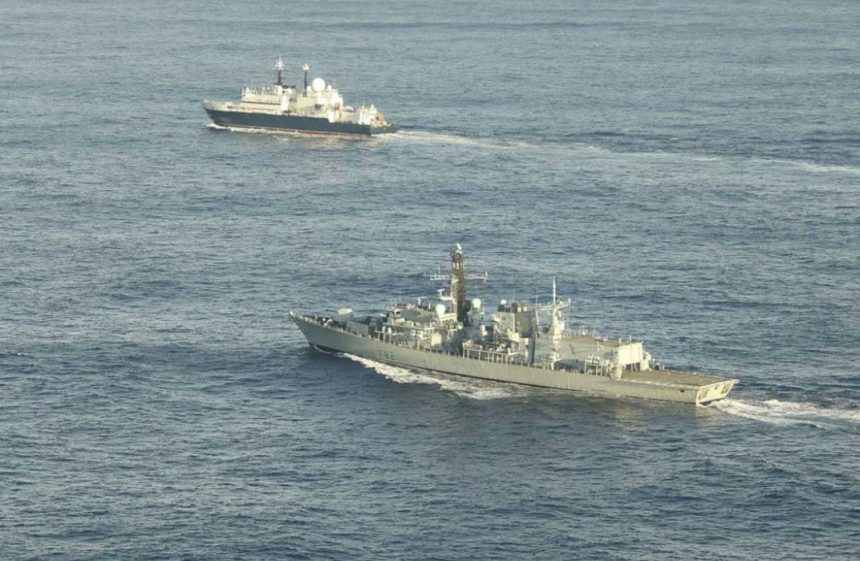A Russian asset boat has sparked renewed security concerns after reportedly pointing spotlights at Royal Air Force aviators, Defence Secretary John Healey has revealed.
Yantar Ship Incident Raises Tensions in UK Waters
Speaking at a Westminster press conference, Mr Healey said the vessel, named Yantar, was operating north of Scotland and had targeted surveillance aircraft monitoring its movements.
“My message to Russia and to Putin is this: We see you. We know what you’re doing. And if the Yantar travels south this week, we are ready,” he said.
This marks the second time in a year that the Yantar, described by Mr Healey as a ship “designed to put … our undersea infrastructure and those of our allies at risk,” has entered UK waters.
The ship is part of a Russian programme run by the Main Directorate of Deep-Sea Research (GUGI), capable of both peacetime surveillance and sabotage in conflict.
“It is a demonstration, if you like, of a British readiness to act, a British capability to act, because, make no mistake, we will not tolerate a threat to the British people’s essential connections under water,” he added.
UK Defence Strengthened Amid Rising Global Threats
Mr Healey warned that the UK must adapt to a “new era of hard power,” citing conflicts in the Middle East, tensions between India and Pakistan, and Chinese espionage targeting MPs.
Over the past year, he added, Europe has faced widespread drone disruptions, Russian incursions into Nato airspace have doubled, and the UK has faced 90,000 cyber attacks on defence systems alone.
The Defence Secretary @JohnHealey_MP this morning confirmed that a Russian spy ship – the Yantar – is on the edge of UK waters, north of Scotland, having entered the UK’s wider waters over the last few weeks.
This is a vessel used for gathering intelligence and mapping… pic.twitter.com/GO6LXVAfgU
— Ministry of Defence (@DefenceHQ) November 19, 2025
The Commons Defence Committee has also issued a stark report, warning Britain is not fully prepared to defend itself against a major attack.
The committee criticised the government for lacking a concrete plan to protect the homeland and overseas territories.
Labour MP Tan Dhesi, chair of the committee, said: “Putin’s brutal invasion of Ukraine, unrelenting disinformation campaigns, and repeated incursions into European airspace mean that we cannot afford to bury our heads in the sand.”
Armed Forces Minister Luke Pollard reassured the public that the UK remains safe but acknowledged that new threats are emerging.
“We can see the way that war is now being fought differently in Ukraine than perhaps we had prepared for in the past,” he said.
Expansion of UK Munitions and Defence Manufacturing
In response to these threats, Mr Healey announced plans to expand production of munitions and military explosives across the UK. At least 13 new sites have been identified for factories, with the first expected to break ground next year.
The move is intended both to strengthen national security and to create over 1,000 new jobs. Potential sites include Grangemouth in Scotland, Teesside in northeast England, and Milford Haven in Wales.
The Ministry of Defence has funded feasibility studies for factories producing explosives, pyrotechnics, and propellants, aiming to restart high-volume production in the UK for the first time in nearly 20 years.
Mr Healey described the initiative as a “fundamental shift” from past approaches, highlighting the government’s commitment to revitalising British industrial heartlands.
Drone and Defence Factories to Boost Security and Jobs
Alongside munitions factories, two new drone factories are set to open this week in Plymouth and Swindon.
Mr Healey said: “We are making defence an engine for growth, unambiguously backing British jobs and British skills as we make the UK better ready to fight and better able to deter future conflicts.”
The announcements come as Prime Minister Sir Keir Starmer visited Berlin to discuss defence and security with German Chancellor Friedrich Merz and French President Emmanuel Macron.
These talks coincide with negotiations over Britain’s participation in a €150bn (£132bn) European defence fund, amid reports that the UK may pull out over French demands for a £5bn contribution.






